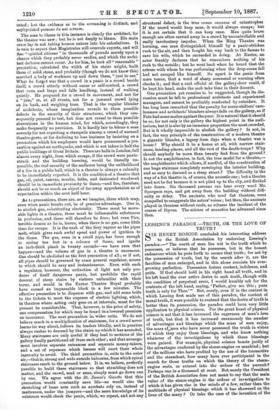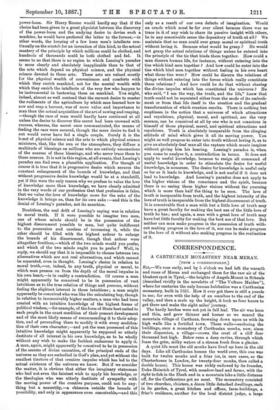LESSING'S PARADOX :—tRIITH, OR THE LOVE OF TRUTH P
SIR HENRY ROSCOE concluded his interesting address to the British Association by endorsing tessing's paradox :—" The worth of man lies not in the truth which he possesses, or believes that be possesses, but in the honest endeavour which he puts forth to secure that truth ; for not by the possession of truth, but by the search after it, are the faculties of man enlarged, and in this alone consists his ever- growing perfection. Possession fosters content, indolence, and pride. If God should hold in his right hand all truth, and in his left band the ever active desire to seek truth, though with the condition of perpetual error, I would humbly ask for the contents of the left hand, saying, 'Father, give me this ; pure truth is only for Thee.' " But, surely, even if in the context in which Leasing first made use of this paradox, the context of moral troth, it were possible to contend that the desire of truth is better than its possession, the paradox could have very little application to physical science. For the great boast of physical science is not that it has increased the eagerness of man's love of truth, but that it has increased enormously the number of advantages and blessings which the mass of men enjoy, the mass cf.:men who have never possessed the truth in virtue of which they enjoy these blessings, and who know nothing whatever of the investigations by which these blessings were gained. For example, physical science boasts justly of the advantages conferred by the steam-engine on mankind ; but of the millions who have profited by the use of the locomotive and the steamboat, how many have ever participated in the search for those truths on which the theory of the steam- engine rests, or entered into the ardour of the pursuit P Perhaps one in a thousand at most. Bat surely the President of the British Association does not mean to say that the main value of the steam-engine is the ardour of investigation to which it has given rise in the minds of a few, rather than the multitude of physical blessings which it has showered on the lives of the many ? Or take the case of the invention of the power-loom. Sir Henry Roscoe would hardly say that if the choice had been given to a great physicist between the discovery of the power-loom and the undying desire to devise such a machine, he would have preferred the latter to the former,—in other words, the keeping of a few keen men's intellects con- tinually on the stretch for an invention of this kind, to the actual mastery of the principle by which millions could be clothed, and hundreds of thousands could be both clothed and fed. It seems to us that there is no region to which Leasing's paradox is more clearly and absolutely inapplicable than to that of the arts which depend on physical science, and the physical science devoted to those arts. These arts are valued mostly for the physical wealth of conveniences and comforts with which they enrich mankind, not for the mental wealth with which they enrich the intellects of the very few who happen to be instrumental in bestowing them on mankind. You might, indeed, almost as well contend that the earnest desire to master the rudiments of the agriculture by which men learned how to sow and reap a harvest, was of more value. and importance to man than the actual acquisition of the art of sowing and reaping, —though the race of man would hardly have continued at all unless the desire to discover this secret had been crowned with success, whereas, the secret once communicated, the means of feeding the race were secured, though the mere desire to find it out would never have fed a single couple. Surely it is the boast of physical science and the arts to which physical science ministers, that, like the sun or the atmosphere, they diffuse a multitude of blessings on millions who are entirely unconscious of the sources of these blessings, and who never trace them to those sources. It is not in this region, at all events, that Lewin g'e paradox can find even a plausible application. For though of course it is true that it is progressive desire which secures the constant enlargement of the bounds of knowledge, and that without progressive desire knowledge would be at a standstill, yet if this were the only reason why we profess to value the love of knowledge more than knowledge, we have clearly admitted in the very words of our profession that that profession is false, that we valve the love of knowledge more for the sake of the knowledge it brings us, than for its own sake :—and this is the denial of Leasing's paradox, not its assertion.
Doubtless, the real drift of Lessing's saying was in relation to moral truth. If it were possible to imagine two men, one of whose minds should be in the possession of the highest discernment possible to man, bat quite indifferent to the possession and careless of increasing it, while the other should be filled with the highest ardour to enlarge the bounds of his discernment, though that ardour were altogether fruitless,—which of the two minds would you prefer, and which of the two minds ought you to prefer ? Well, in reply, we should say that it is impossible to choose between two alternatives which are not real alternatives, and which cannot be separated, even in thought. Leasing's choice in relation to moral truth,—or, indeed, to any truth, physical or moral, to which man presses on from the depth of the moral impulse in his own heart,—is in reality a contradiction. Of course a man might apparently be conceived to be in possession of vast intuitions as to the true relation of things and persons, without feeling the slightest interest in those intuitions ; a man might apparently be conceived who was like the calculating boy, though in relation to inconceivably higher matters, a man who had been created with an intuitive knowledge of the highest forms of political wisdom,—for example, of the form of State best suited to each people in the exact condition of their present development and of the most likely means of recommending it to their adop- tion, and of persuading them to modify it with every modifica- tion of their own character ; —and yet the man possessed of this intuitive knowledge might apparently be supposed so utterly destitute of all interest in his own knowledge, as to be wholly without any wish to make the feeblest endeavour to apply it. A man, again, might apparently be conceived to be in possession of the secrets of divine causation, of the principal ends of the universe as they are embodied in God's plan, and yet without the smallest tincture of that creative impulse which has led to the actual existence of the universe we know. But if we consider the matter, it is obvious that either the imaginary statesman who had not even the faintest wish to apply his knowledge, or the theologian who was utterly destitute of sympathy with the moving power of the creative purpose, could not be any- thing but a nonentity,—a chimera outside the bounds of possibility, and only in appearance even conceivable,—and this only as a result of our own defects of imagination. Would an oracle which must be for ever silent because there was no trace in it of any wish to share its passive insight with others, be in any conceivable sense the depository of truth at all? We maintain that no man could ever grasp moral or spiritual truth without loving it. Because what would he grasp P He would not grasp the actual relations of things unless he entered into the principle of the tie that binds them together. How could a man discern human life, for instance, without entering into the ties which bind men together ? And how could he enter into the ties which bind men together without feeling in his own heart what those ties were P How could he discern the relations of things without entering into the forces which really constitute these relations ? And how could he do that without sharing the divine impulse which has constituted the universe ? He who said, " I am the way, the truth, and the life," knew that truth could not be separated either from the mode of its embodi- ment or from that life itself in the creation and the gradual transformation of which creation results. There is nothing but emptiness in the notion that a universe of which attractions and repulsions, physical, moral, and spiritual, are the very essence, can be conceived at all by one who is not conscious in himself of those physical, moral, and spiritual attractions and repulsions. Truth is absolutely inseparable from the clinging attitude of mind which gives it all its moving power. You might as well propose to enter into truth without loving it, as to give an absolutely deaf man all the rapture which music inspires without giving him his hearing. Lessing's paradox is, when you come to analyse it, a contradiction in terms. It does not apply to useful knowledge, because to resign all command of useful knowledge in order to stimulate the desire for useful knowledge, is nonsense. The desire for knowledge is useful only so far as it leads to knowledge, and is not useful if it does not lead to knowledge. And Lessing's paradox does not apply to the higher visions of the conscience and the spirit, because there is no seeing these higher visions without the yearning which is more than half the thing to be seen. The love of truth is inseparable from truth, and the highest intensity of the love of truth is inseparable from the highest discernment of truth. It is conceivable that a man with but a little love of truth may have a great faculty for making the best use of the little love of troth he has; and again, a man with a great love of truth may have but little faculty for making the best use of that love. But neither can man make progress in the possession of truth with- out making progress in the love of it, nor can he make progress in the love of it without also making progress in the realisation of it.



































 Previous page
Previous page